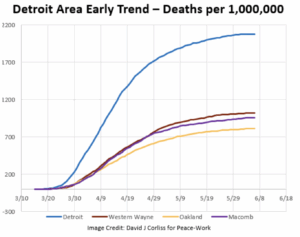Community-Based Data for Good Projects: Think Statistically, Act Locally
This column is written for those interested in learning about the world of Data for Good, where statistical analysis is dedicated to good causes that benefit our lives, our communities, and our world. If you would like to know more or have ideas for articles, contact David Corliss.
David Corliss is the principal data scientist at Grafham Analytics and the founder of Peace-Work, a Data for Good nongovernmental organization.
With the publication in January of the 2024 Data for Good Challenge List, Stats4Good will be looking at some of the challenges in detail. Developing more local studies was identified as the top challenge in biostatistics, but it’s really needed in all areas.
The best data for local studies is usually found in data maintained by local organizations such as government agencies, nonprofits, and charities. Intersectionality is important. For example, it’s been my experience that the organizations with the best data and understanding of poverty on a local level are the school districts, with the population percentage of free and reduced lunch one of the most predictive demographic variables for a host of issues and concerns.
In opportunities this month, submissions for the 2024 Women in Statistics and Data Science Conference are open until April 19. The conference will be in Reston, Virginia, near Washington, DC, October 16–18.
Also, the National Institute of Justice is accepting applications for its graduate research fellowships. The program provides up to three years of support within a five-year period for doctoral students. Applications are due by April 17.
Health data starts with the county health department—and often ends there, as well—with the state and federal governments rolling up data captured by the county. Local advocacy organizations can often be found addressing issues that matter to you most. Union locals will have data on the work force, safety, and local educational challenges. Your town’s major might not know how many people in your community are functionally illiterate, but a shop steward will.
All this makes building relationships with local subject experts and data stewards an important first step in developing community-based projects. Author Stephen M. R. Covey wrote that business moves forward at the “speed of trust.” This is especially true of Data for Good, where progress is driven by trust much more than technology.
Partnering with local subject matter experts in academia, government, and industry provides access to data and key insights important for success. Working with existing local groups, many of which will have decades of experience, can also put you in touch with a critical but often overlooked element: people who have experienced the issue you seek to address. By partnering with those already working in the area—getting to know them and volunteering for projects before adding statistics and data science—you make the most of your work in Data for Good.
For example, in the first wave of the COVID-19 pandemic—before vaccines were available and treatment methods were in their early stages—people in many urban centers suffered. One such center was Detroit, where the local health department data revealed an important finding. While most data was reported at the county level, Detroit has its own health department and reported COVID numbers separately. The time series of deaths per capita shows the city had a far higher mortality rate than the balance of Wayne County or the two neighboring counties. This analysis, requested by local religious leader Don Kreiss, was repeated for other metropolitan areas to identify a consistent disparate impact of the first COVID wave on marginalized communities such as people of color and helped direct the response of local community service organizations.

Geographic time series of the early COVID pandemic in the Detroit area. The disparate impact on marginalized communities helped inform action plans by local community service organizations.
The opportunities for local D4G studies are endless. Social service organizations are empowered to find more volunteers, optimize financial support, target areas of greatest need, and leverage data-driven decision-making to drive better outcomes. ASA chapters can play a leading role in promoting D4G projects, finding statisticians and data scientists to undertake them, and building the community partnerships so important to maximizing impact.
Chapters can organize hackathons to address an issue of local importance. These are a win for everyone involved, with chapter members reaching out to the community, forming partnerships, building trusted relationships, and recruiting new members eager to use statistical science to serve their communities. Thinking statistically and acting locally is a powerful strategy for Data for Good!


















Leave your response!